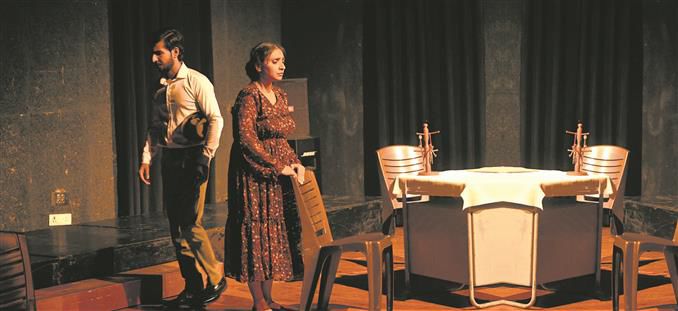With Bhram-Dosh, theatre director Umesh Kant highlights people’s relentless pursuit of goals and why it’s necessary to stop and appreciate the gift of life
Sheetal
On Friday evening, the Chandigarh Sangeet Natak Akademi presented Hindi play Bhram-Dosh. The Theatre Lab’s production, the play was directed by its founder Umesh Kant. Bhram-Dosh is adapted from French-Algerian philosopher Albert Camus’s play Wrong Calculations.
One should know the basic theories so that one knows how much creative liberty one can take with a script. If the script is a ‘patient’, the director is a ‘doctor’. If one gives a wrong injection to the script, it might fall flat on stage. — Umesh Kant
During a backstage conversation, theatre thespian Umesh Kant, an alumnus of the Department of Indian Theatre, Panjab University, Chandiagrh, explained how a play like Bhram-Dosh puts into perspective the greed of the human race. “In today’s time, we all are working towards our next big desire, instead of taking a pause and appreciate what we already have,” he said.
The thought-provoking yet entertaining play kept the audience engrossed with the potent theme of unrealistic ambition and its consequences.
The play revolved around Martha and her mother, who conspired to loot their wealthy customers at their hotel and kill them. Tragedy struck when Martha failed to recognise her own brother John, who had left the family long ago, and killed him.
The sparks of creativity and intellectual approach of the director and actors made the Hindi version of the play a marvel of theatre aesthetics. Pranav Vashisht, Babita Kapoor, Khushpreet Kaur, Pragati Sharma and Kirandeep Singh essayed their characters with conviction.
On working with young cast, Umesh Kant called it an immersive learning experience for all party involved. “I look at it this way. Every time my actors commit a mistake and I correct them, it’s not that only they learn, I too learn from it. It’s an enjoyable process and those who are dedicated will progress,” he informed.
Umesh Kant does not like to watch his own plays. He believes in his actors and their abilities. “I don’t watch my own plays because I just cannot. It’s like I have given my best and leave the rest to fate. As a director it’s my job to cast the right actors for the parts. So many times I have replaced the person I originally cast for a particular role with someone else, but it’s purely a professional decision. I don’t allow nepotism to creep into my profession.”
According to him, theatre shapes an actor because there’s no scope mistake. “In cinema, you get many takes, and have two or three cameras to catch your moves. But in a play, each person in the audience has two eyes and in front of these collective 200 and more cameras that are watching, you cannot make a wrong move without getting caught. That’s the beauty of theatre.”
Umesh Kant plans to bring another play for Tricity theatre lovers, which is again a Hindi adaptation of Agatha Christie’s The Mousetrap.









